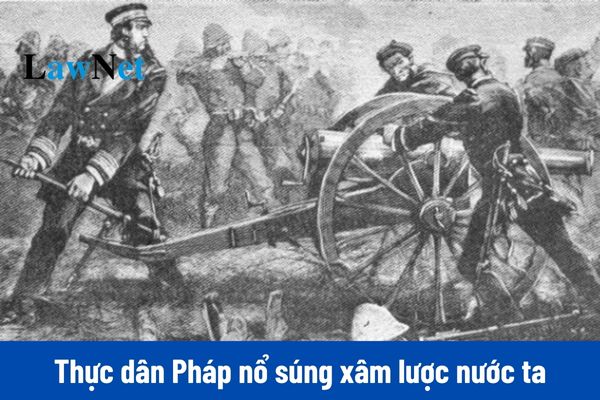Vietnam: When did the French colonialists launch their invasion into our country? What are the features of 12th-grade History?
When did the French colonialists launch their invasion into our country?
The French colonialists officially launched their invasion of Vietnam at the beginning of September 1858 on the Son Tra Peninsula, Da Nang. This marked the beginning of nearly 100 years of French invasion and domination over our country.
This attack was carried out by the Franco-Spanish coalition with the initial goal of capturing Da Nang as a springboard to conquer Vietnam. However, due to strong resistance from our army and people, the French shifted their direction to Gia Dinh (Saigon) in 1859 and continued to expand their invasion to other regions.
In the second half of the 19th century and the first half of the 20th century, our nation had to undertake two resistance wars against the French colonialists who fired upon us. Though the outcomes of these two wars differed, they both left historical lessons on promoting the tradition of patriotism and the strength of the entire nation for today's cause of building and defending the Fatherland.
Note: Information is for reference purposes only!

When did the French colonialists launch their invasion into our country? (Image from the Internet)
What are the features of 12th-grade History in Vietnam?
Under the General Education Program for History issued alongside Circular 32/2018/TT-BGDDT, the features of 12th-grade History in particular and History at the upper secondary level in general are stipulated as follows:
- History is a subject belonging to the group of Social Sciences, selected based on career orientation at the upper secondary level.
- History aims to help students form and develop historical capabilities, a component of scientific capacity, while also contributing to the formation and development of the key qualities and general abilities identified in the overall program.
- History plays a leading role in educating patriotism, national pride, historical traditions, and national culture. It helps students recognize and apply historical lessons to solve real-life problems, develop vision, and consolidate human values, community spirit, tolerance, and compassion; contributing to forming and developing the qualities of Vietnamese citizens, and global citizens in the era's developmental trend.
- History forms and develops historical thinking, systematic thinking, critical thinking, skills in exploiting and using historical sources, recognizing, and presenting history logically across different times and spaces, and connecting the past with the present.
- History helps students recognize the scientific and practical value of history in modern social life, fostering an understanding and love for national and human history and culture; guiding students towards career choices such as social and humanities research, diplomacy, management, tourism activities, cultural industries, information, and communication, etc.
- The general education program for History systematizes and consolidates general historical knowledge at the basic education stage while helping students delve deeper into core historical knowledge through subjects and topics about world history, Southeast Asian history, and Vietnamese history. The teaching methods of History are implemented based on fundamental historical principles and modern educational methods.
What learning outcomes are required for 12th-grade History in Vietnam?
Under Clause 4 of the General Education Program for History at the upper secondary level issued alongside Circular 32/2018/TT-BGDDT (amended by Article 2 of Circular 13/2022/TT-BGDDT), the learning outcomes required for 12th-grade History in Vietnam are as follows:
(1) Regarding key traits and general abilities
History contributes to forming and developing key qualities and general abilities at levels suitable for the subject and education level as regulated in the overall program.
(2) Regarding specific abilities
The general education program for History helps students develop historical abilities based on basic and advanced historical knowledge about the world, the region, and Vietnam through a system of topics and specializations on political, economic, social, cultural, and civilizational history. Historical capabilities consist of exploring history; perceiving and thinking historically; applying learned knowledge and skills.
Specific manifestations of historical capabilities are presented in the following table:
- Exploring history:
+ Identifying types of historical documents; understanding the content, exploiting, and utilizing historical documents in the learning process.
+ Reconstructing and presenting through speaking or writing the course of historical events, characters, and processes from simple to complex; identifying historical events in specific spatial and temporal frameworks.
- Perceiving and thinking historically
+ Explaining the origins and dynamics of historical events from simple to complex; outlining the development of history in diachronic and synchronic perspectives; comparing similarities and differences between historical events, explaining causality within historical processes.
+ Providing personal opinions, and assessments on historical events, characters, and processes based on historical perception and thinking; understanding historical continuation and change; engaging in multi-perspective thinking when evaluating or seeking answers on events, characters, and historical processes.
- Applying learned knowledge and skills:
Drawing historical lessons and applying historical knowledge to explain real-life issues; on this foundation, possessing the ability to independently explore historical problems, develop creative capabilities, and handle information from various sources, with consciousness and lifelong self-directed historical learning capabilities.

